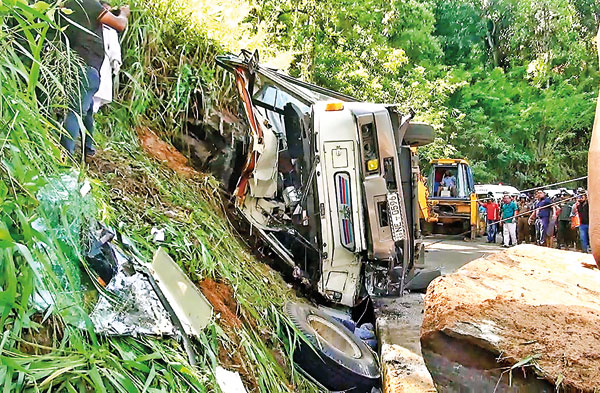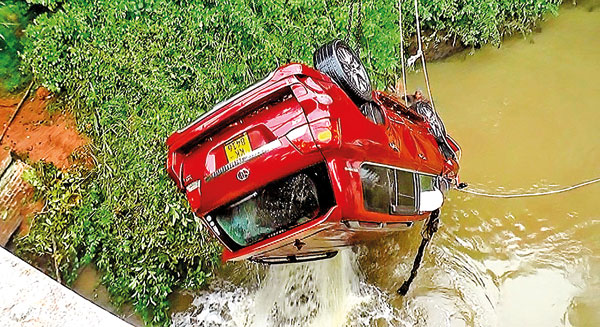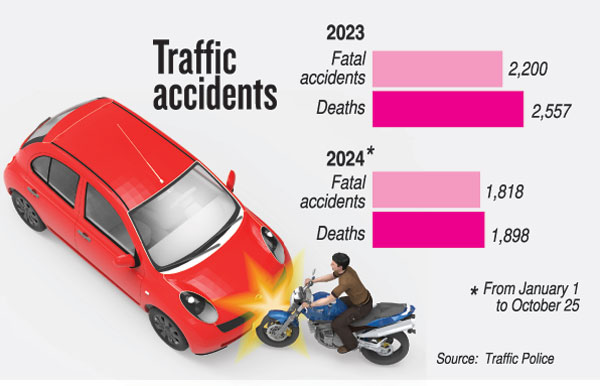News
Driver responsibility has critical role in ensuring road safety
View(s):By Nathara Abeywickrema
In recent weeks, the wet weather has contributed to a troubling series of road traffic accidents, causing deaths and injuries and raising concerns about public safety.
Police spokesman DIG Nihal Thalduwa reported that nearly 2,000 Sri Lankans lost their lives in road traffic accidents from January 1 to October 25 this year, with 1,818 fatal accidents leading to 1,898 deaths. Of those killed, 676 were pedestrians.
Road accidents remain a pressing issue in Sri Lanka; in 2023 alone, 2,557 fatalities were recorded from 2,200 fatal incidents.

Road accidents remain a pressing issue in Sri Lanka
The monsoon seasons significantly increase the risk of road traffic accidents due to slippery surfaces, poor visibility, and flooded roads, often caused by reduced tyre traction, hidden potholes, and neglect of vehicle maintenance.
However, experts suggest that these risks can be mitigated by adhering to speed limits, maintaining safe distances, doing regular vehicle checks, using low-beam headlights for better visibility, and avoiding flooded routes.
Dr. Samitha Siritunga, head of the injury prevention and control unit at the Ministry of Health, said a combination of factors, including vehicle condition and driver behaviour, cause accidents. “Even with a well-maintained vehicle, human actions play a role. A driver who knows he is under the influence of liquor should never take the wheel. Responsibility lies on all sides.”

The monsoon seasons significantly increase the risk of road traffic accidents due to slippery surfaces, poor visibility, and flooded roads
He also underscored the importance of post-accident care, particularly first-aid, which he believes is crucial to promoting safety. “Without timely first-aid, a minor injury can escalate to a severe condition, and in some cases, fatalities can occur due to lack of immediate care. Swift first-aid intervention can mean the difference between life and death, helping preserve life, reduce pain, prevent complications, and promote recovery.”
Dr. Siritunga said road users, drivers, passengers, and pedestrians alike should be vigilant and be prepared to respond to unexpected situations.
Drivers can play a crucial role in ensuring road safety during the rainy seasons by being responsible. Regular vehicle checks, such as inspecting tyres, brakes, and wipers, help to maintain optimal performance in wet conditions. Additionally, cautious driving, including avoiding sudden manoeuvres and maintaining a steady speed, can significantly reduce the risk of accidents.
Local authorities are being urged to address infrastructure issues that heighten risks during the rainy seasons. Poorly maintained roads and inadequate drainage systems increase hazards, as flooding and potholes increase the likelihood of accidents. Improved road maintenance and investment in efficient drainage are essential to ensure safer transport and reduce accident rates in adverse weather.
Dr. T. Sivakumar, senior lecturer in transport management and logistics at the University of Moratuwa, emphasised the urgent need to reform motor traffic systems, beginning with stricter standards for issuing driving licences and upgrading driving school curricula.
He highlighted the “three Es”—education, engineering, and enforcement—as essential for accident prevention.
Dr. Sivakumar suggested that driving instructors should receive more rigorous training, with a stronger focus on vehicle mechanics, human psychology, and accident dynamics. Theory sessions should delve deeper into these topics to better prepare drivers. He also recommended improving the current multiple-choice driving test format, noting that under the current system, licences are issued without a proper test in contrast to the thorough, degree-level rigour of driving exams in some foreign countries.
Dr. Sivakumar also stressed the importance of stricter enforcement.
He pointed to other countries that use advanced technology to monitor traffic violations in real time, capturing everything from reckless overtaking to pedestrian mishaps. He argued that Sri Lanka should adopt similar technology, as its cost-effectiveness and practicality outweigh any perceived limitations.

Motor Traffic Department Legal Officer K.I. Yogachandra said preparations to implement the Demerit Points System (DPS) are nearly complete and set to take effect by February or March 2025. It aims to encourage compliance with traffic laws and improve safety. He said the government policy is expected to introduce updated regulations with improved enforcement mechanisms.
Accidents may be unpredictable, but often preventable with precautions. Establishing a culture of safety requires sustained effort and cooperation from local authorities, businesses, and residents alike. By being proactive, it is possible to address the root causes and create a safe environment.
The best way to say that you found the home of your dreams is by finding it on Hitad.lk. We have listings for apartments for sale or rent in Sri Lanka, no matter what locale you're looking for! Whether you live in Colombo, Galle, Kandy, Matara, Jaffna and more - we've got them all!

